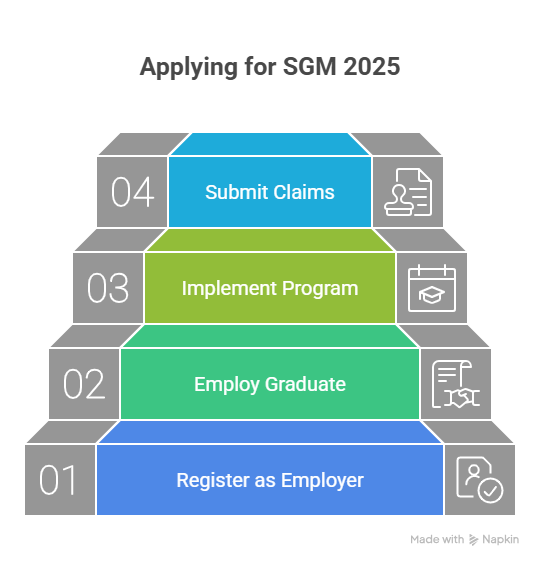
Key Takeaways:
- The MADANI Graduate Scheme (SGM) helps Malaysian graduates secure jobs and industry-relevant skills.
- Eligibility is for recent graduates who are unemployed, underemployed, or first-time job seekers.
- Benefits include monthly allowances, structured training, career pathways, and employer incentives.
- Industry focus: High-demand sectors such as the digital economy, green industries, and innovation-driven fields.
- SGM differs from past programmes with better allowances, stronger industry partnerships, and a focus on future-ready skills.
- Applications are handled via the HRD Corp portal, requiring resumes, transcripts, and supporting documents.
- This article is especially relevant for employers who want to understand how to register with HRD Corp and claim benefits under the scheme.
- Note: This article is meant as a reference based on HRDC’s official circular number 1/2025 dated 22nd August 2025. The interpretation of the SGM may evolve as further clarifications are issued, and Thriving Talents will update this article from time to time to reflect the latest understanding. Please be aware that policies may change, and this content should not be taken as definitive or exhaustive guidance.
Introduction
The MADANI Graduate Scheme (SGM) is a government-backed initiative designed to support Malaysian graduates in securing meaningful employment and industry-relevant skills. It focuses on boosting graduate employability, reducing underemployment, and ensuring young professionals are ready to contribute to the country’s economic growth.
As part of Malaysia’s broader commitment to industry readiness and workforce transformation, the scheme provides both financial allowances and structured training pathways, creating opportunities for graduates while helping industries access fresh talent.
This article is intended as a helpful reference to give employers an overview of the scheme’s requirements, benefits, and registration process with HRD Corp, so they can better understand how participation and hiring through SGM may work in practice.
Note: This article is meant as a reference based on HRDC’s official circular number 1/2025 dated 22nd August 2025. The interpretation of the SGM may evolve as further clarifications are issued, and Thriving Talents will update this article from time to time to reflect the latest understanding. Please be aware that policies may change, and this content should not be taken as definitive or exhaustive guidance.
What is the MADANI Graduate Scheme, And When Was It Launched?
The MADANI Graduate Scheme (SGM), also known as Skim Graduan MADANI, is a national initiative introduced by the Malaysian Government to support fresh graduates entering the workforce.
It was officially launched under HRD Corp Employer’s Circular No. 1/2025 and is managed by the Human Resource Development Corporation (HRD Corp).
The scheme addresses pressing challenges such as graduate unemployment, underemployment, and industry skills gaps. By providing financial support (through registered employers) and structured training opportunities to fresh graduates, SGM aims to bridge the gap between academic qualifications and industry expectations.
Importantly, the programme is aligned with the MADANI framework, which promotes sustainable socio-economic development while preparing Malaysia’s workforce for future challenges in digitalisation, green industries, and innovation-driven sectors.
Who Can Apply for SGM?
The MADANI Graduate Scheme is designed to give fresh graduates a structured pathway into the workforce.
According to the current version of the scheme, the claimable amount (Graduate Skills Development Allowance) amounts to 12 months’ basic salary paid by the employer to the new hire. Registered employers are eligible to claim 50% of the levy balance as at 1 January of the application year. The grant end date corresponds to the final month of the programme.
Also note that the scheme requires that the application must be submitted within 6 months of the completion date of the graduate skills development programme. Registered employers may claim financial assistance only after the completion of the programme. However, they may continue to apply for other HRD Corp training assistance for the same graduate(s) during the graduate skills development programme.
The eligibility criteria are clear and focus on supporting young Malaysians who are most in need of opportunities.
- Eligibility Criteria: Malaysian citizens who are recent graduates from local or international universities, colleges, or training institutions. They should have completed all higher academic requirements (including Malaysian Skills Certification – (SKM) Level 4 and above). Graduates must complete a twelve (12) month programme for it to be claimable.
- Target Graduates: Those who are unemployed, underemployed, or first-time job seekers and are seeking a full-time job in the industry, either a permanent or fixed-term contract for a minimum of twelve (12) months.. The scheme places special emphasis on helping graduates who may struggle to find their first stable role.
- Industry Focus: SGM prioritises sectors identified by the government as growth engines for the economy. These include technology and digital economy, green and sustainable industries, financial services, and other high-demand sectors that require skilled talent.
Please note that the following supporting documents are required:
- Higher education completion/ graduation letter or certificate from a recognised institution that verifies a student has completed his/her higher learning requirements.
- Employment/Offer letter from current company with monthly allowance equivalent to basic salary details.
- Employment/Offer letter from previous company for graduates with prior working experience (if any).
Please note that the details shared here are meant as a friendly reference based on the current understanding of the scheme, and they may be updated or clarified by HRD Corp over time.
Key Benefits of the MADANI Graduate Scheme
The MADANI Graduate Scheme (SGM) provides value that goes beyond just getting a job. It is structured to ensure graduates develop skills, gain experience, and build long-term career opportunities — while employers also benefit from stronger talent pipelines.
- Monthly Allowances – Graduates participating in the SGM scheme receive financial support (from the employer who hired them) throughout the programme, easing the burden of transitioning into the workforce. This allowance not only helps with daily expenses but also allows participants to focus fully on learning and contributing at work.
- Structured Training – Every participant is given access to industry-led training, upskilling, and reskilling opportunities. These programmes are curated to address real market needs, from digital and green skills to business communication, ensuring graduates are job-ready in high-demand sectors.
- Career Pathways – Unlike short-term employment schemes, SGM is designed with sustainability in mind. Graduates are matched to industries where they can build long-term careers, with opportunities to transition into permanent roles once the programme is completed.
- Employer Incentives – Companies that hire under the scheme receive subsidies and support to train graduates. This lowers the risk and cost for businesses, encouraging them to invest in fresh talent while developing a pipeline of future-ready employees.
- Sustainable Development – The scheme is not a one-off intervention but part of Malaysia’s long-term workforce development strategy. Aligning with the MADANI framework ensures that graduates contribute to socio-economic transformation, from digital innovation to environmental sustainability.
Together, these benefits make SGM a win-win for graduates seeking stability and employers looking for skilled, motivated new hires.
How SGM Differs from Previous Graduate Programs?
The MADANI Graduate Scheme (SGM) builds on past graduate initiatives in Malaysia, but introduces important upgrades to make the experience more meaningful and future-oriented. Here’s how it stands apart:
Better Allowance Structure
Compared to earlier schemes, SGM provides improved and more consistent financial support so graduates can focus on learning.
Stronger Industry Partnerships
Previous programmes often had limited employer involvement. SGM is designed with direct collaboration between HRD Corp and industry leaders in high-demand sectors, ensuring training is relevant and aligned to real market needs.
Focus on Future Skills
Earlier graduate schemes focused heavily on general or soft skills. SGM adds sharper emphasis on digital skills, green technology, innovation, and emerging industries to match Malaysia’s evolving economic priorities.
Long-Term Development & Sustainability
Most past programmes were short-term; some lasted 6-12 months. SGM offers more extended and structured development paths to reduce reliance on temporary placements, ensuring graduates are well-prepared for long-term career growth.
Recognition & Quality Benchmarking
SGM’s implementation and providers are under more rigorous standards, helping ensure programmes are well designed, well delivered, and impactful.
How do Employers Apply for SGM?

Applying for the MADANI Graduate Scheme (SGM) is straightforward. Here’s the step-by-step process for employers:
- Step 1: Register as an Employer: Ensure your company is registered with HRD Corp.
- Step 2: Employ an Eligible Graduate: Next, the registered employers need to hire Malaysian graduates who meet the scheme’s eligibility requirements.
- Step 3: Implement the 12-Month Program: As an employer, conduct the 12-month structured development program for the hired graduates.
- Step 4: Submit Training Claims: Once the 12-month program is completed, employers must submit their claims to HRD Corp. Remember that you need to submit claims within 6 months of the program’s completion.
Also read: How to Integrate New Graduates Into Your Team: Lessons from the MADANI Graduate Scheme
Tips for Applicants
To make your SGM application stand out, keep these practical tips in mind:
- Tailor applications by customising resumes and cover letters to highlight relevant skills for each job.
- Focus on entry-level roles and emphasise transferable skills like teamwork, problem-solving, and communication.
- Build a strong online presence with a polished LinkedIn profile, professional headshot, and updated achievements.
- Highlight internships, projects, or part-time work to showcase real-world experience and work ethic.
- Network and upskill through alumni, LinkedIn, career fairs, online courses, and certifications.
- Prepare for interviews by researching companies, practising with mock sessions, and preparing thoughtful questions.
- Follow up after interviews with thank-you notes to reinforce interest and professionalism.
Thrive in your first job by adopting a learning mindset, earning trust through reliability, setting boundaries, and networking internally.
Conclusion
The MADANI Graduate Scheme (SGM) is more than just another government programme — it’s a bridge between graduates and meaningful, future-ready careers. By offering allowances, structured training, and direct links to industry, it gives young Malaysians the chance to gain real-world experience while building skills for long-term growth.
For employers, SGM is equally valuable. It reduces the cost and risk of hiring graduates while helping industries shape a workforce aligned with Malaysia’s economic transformation goals.
If you’re an employer, participating gives you access to a pool of eager, skilled talent.
Please note that this article is based on HRDC’s official circular number 1/2025 dated 22nd August 2025. It is intended as a friendly reference based on the current interpretation of the scheme. Thriving Talents will continue to update this article as HRD Corp issues new circulars or clarifications to help readers stay aligned with the latest developments. In the event this article is not updated immediately, readers should always refer to HRDC’s official announcements as the final source of truth.


